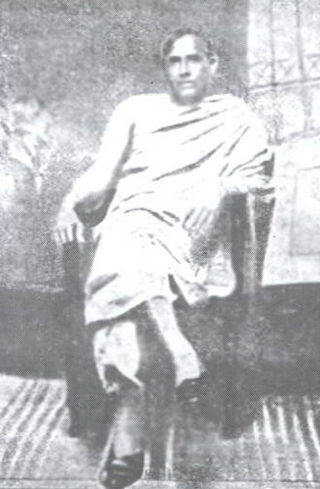Dasa is a Sanskrit word found in ancient Indian texts such as the Rigveda, Pali canon, and theArthashastra. The term may mean "slave", "enemy" or "servant," but Dasa or Das can also have the following connotations: "servant of god", "devotee," "votary" or "one who has surrendered to God." Dasa may be a suffix of a given name to indicate a "servant" of a revered person or a particular deity.

Satprem was a French author and a disciple of Mirra Alfassa.

Integral yoga, sometimes also called supramental yoga, is the yoga-based philosophy and practice of Sri Aurobindo and The Mother. Central to Integral yoga is the idea that Spirit manifests itself in a process of involution, meanwhile forgetting its origins. The reverse process of evolution is driven toward a complete manifestation of spirit.
Kaikhosru Dhunjibhoy Sethna was an Indian poet, scholar, writer, philosopher, and cultural critic. He published more than 50 books. He was known by the diminutive Kekoo, but wrote his poetry under nom de plume of Amal Kiran.
Pavitra was one of the very early disciples of Sri Aurobindo and The Mother. The name was one of Srimati Radharani's 1000 names.

The Sri Aurobindo Ashram is a spiritual community (ashram) located in Pondicherry, in the Indian territory of Puducherry. The ashram grew out of a small community of disciples who had gathered around Sri Aurobindo after he retired from politics and settled in Pondicherry in 1910. On 24 November 1926, after a major spiritual realization, Sri Aurobindo withdrew from public view in order to continue his spiritual work. At this time he handed over the full responsibility for the inner and outer lives of the sadhaks and the ashram to his spiritual collaborator, "The Mother or La Mère", earlier known as Mirra Alfassa. This date is therefore generally known as the founding-day of the ashram, though, as Sri Aurobindo himself wrote, it had "less been created than grown around him as its centre."

Haridas Chaudhuri was an Indian integral philosopher. He was a correspondent with Sri Aurobindo and the founder of the California Institute of Integral Studies (CIIS).
Savitri: A Legend and a Symbol is the poetic main work of Sri Aurobindo, composed in nearly 24000 lines in blank verse. It is based on the legend of Savitri and Satyavan in the Mahabharata, which was given a symbolic significance by Sri Aurobindo. In his epic poem he deals with numerous subjects and describes especially the spiritual paths of Savitri and her father Aswapati, striving to reach a higher stage of evolution.
Emperor v Aurobindo Ghosh and others, colloquially referred to as the Alipore Bomb Case, the Muraripukur conspiracy, or the Manicktolla bomb conspiracy, was a criminal case held in India in 1908. The case saw the trial of a number of Indian nationalists of the Anushilan Samiti in Calcutta, under charges of "Waging war against the Government" of the British Raj. The trial was held at Alipore Sessions Court, Calcutta, between May 1908 and May 1909. The trial followed in the wake of the attempt on the life of Presidency Magistrate Douglas Kingsford in Muzaffarpur by Bengali nationalists Khudiram Bose and Prafulla Chaki in April 1908, which was recognised by the Bengal police as linked to attacks against the Raj in the preceding years, including attempts to derail the train carrying Lieutenant-Governor Sir Andrew Fraser in December 1907.
Indra Sen was a devotee of Sri Aurobindo and The Mother, psychologist, author, and educator, and the founder of Integral psychology as an academic discipline.
Arya: A Philosophical Review was a 64-page monthly periodical written by Sri Aurobindo and published in India between 1914 and 1921. The majority of the material which initially appeared in the Arya was later edited and published in book-form as The Life Divine, The Synthesis of Yoga, The Secret of the Veda, The Foundations of Indian Culture and The Ideal of Human Unity as well as a number of translations of Vedic literature.
The Advent is a quarterly magazine produced by the Sri Aurobindo Ashram, and is "Dedicated to the Exposition of Sri Aurobindo's Vision of the Future".
Ambulal Balkrishna Purani was an Indian writer. He was a prominent disciple and biographer of Sri Aurobindo.

Mirra Alfassa, known to her followers as The Mother or La Mère, was a French-Indian spiritual guru, occultist and yoga teacher, and a collaborator of Sri Aurobindo, who considered her to be of equal yogic stature to him and called her by the name "The Mother". She founded the Sri Aurobindo Ashram and established the town of Auroville; she was influential on the subject of Integral Yoga.

Sri Aurobindo was an Indian philosopher, yogi, maharishi, poet, and Indian nationalist. He was also a journalist, editing newspapers such as Bande Mataram. He joined the Indian movement for independence from British colonial rule, until 1910 was one of its influential leaders, and then became a spiritual reformer, introducing his visions on human progress and spiritual evolution.
Supermind, in Sri Aurobindo's philosophy of integral yoga, is the dynamic manifestation of the Absolute, and the intermediary between Spirit and the manifest world, which enables the transformation of common being into Divine being.

Jatindra Nath Banerjee was one of two great Indian nationalists and freedom fighters – along with Aurobindo Ghosh – who dramatically rose to prominence between 1871 and 1910.
Ramesh Lal Bijlani, also known as R.L. Bijlani, is an Indian writer, inspirational speaker, medical scientist and retired Professor of Physiology who has specialized in physiology, nutrition, lifestyle medicine and yoga. He was educated at the All India Institute of Medical Sciences, New Delhi and the Massachusetts Institute of Technology, Cambridge, MA, USA.
Marguerite (Maggi) Lidchi-Grassi is a writer and spiritual teacher.
Sampadananda Mishra is a Sanskrit scholar from Odisha, specializing in grammar. Mishra was awarded the Maharshi Badrayan Vyas Award for Sanskrit in 2012 by the President of India Pratibha Patil. He was conferred with Sahitya Akademi Bala Puraskar 2018 for his book Shanaih Shanaih.






